Land Tussle: Ezeonwuka Floors Tansian University Again As Court Dismisses School's Appeal
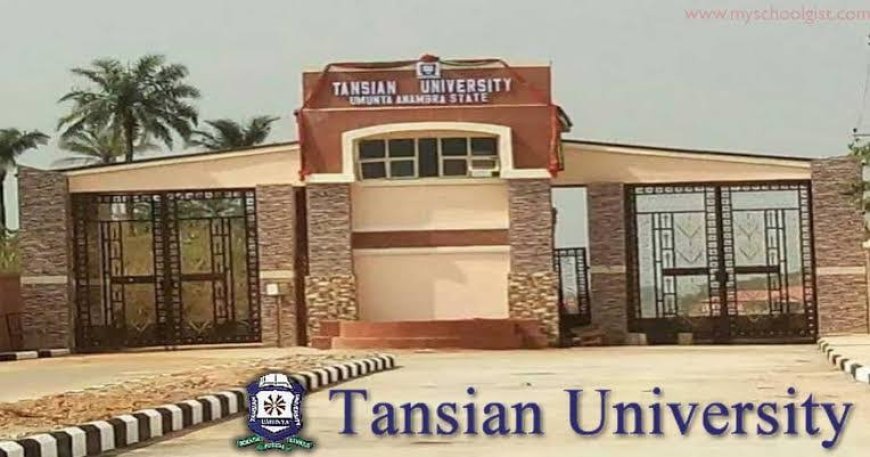
By Izunna Okafor, Awka
The protracted legal battle that has raged between the Tansian University in Anambra State and Anambra Industrialist, Chief Romanus Ezeonwuka, has seen the latter emerging victorious again (now in the Appeal Court), further upholding his earlier victories and his claims over disputed property amidst accusations and counterclaims of its ownership.
With the latest ruling dismissing and striking out an appeal (with the appeal number: CA/AWK/67/2019) filed by the Tansian University, the Appeal Court has also marked another significant milestone on the long-standing dispute, reinforcing Ezeonwuka's co-ownership rights over the land on which Tansian University's campus in Oba, Idemili South Local Government Area of Anambra State, is located.
The latest victory was spelled out in a judgment delivered in a court proceeding dated May 14, 2024 and signed by three Appeal Court Justices, Justice Obietonbara O. Daniel-Kalio, Justice Isa Bature Gafai, and Justice Asma'u Musa Mainoma, upholding the earlier victories of Chief Romanus Ezeonwuka (also known as Rommy Ezeonwuka) and his company, the Ranent Industries Company Ltd. in the lower court.
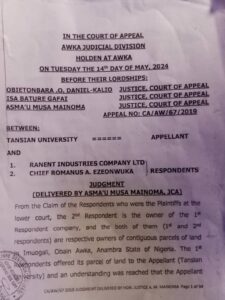
This reporter, Izunna Okafor, gathered that the origin of the protracted litigation dates back to a foundational disagreement over property rights.
The Tansian University, founded by the now-late Rev. Fr. Professor Johnbosco Akam, saw itself entangled in legal turmoil, following assertions by Chief Ezeonwuka (the MD/CEO of Ranent Industries Company Ltd., Oba) that the University's campus in Oba was built on land contributed by him as a co-investor in setting up the University, being the land where his factory, the Ranent Industries Company Ltd., was situated before he contributed it a portion of it as his own equity and capital commitment as a co-investor in setting up the University.
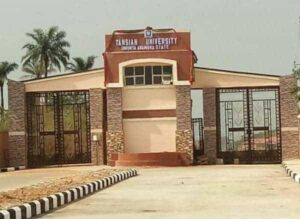
It was further gathered that the Fr. Akam (a monsignor serving under the Onitsha Archdiocese), and Chief Ezeonwuka had some well-sealed terms before going into the deal that culminated into birth of the Tansian University — a dream that eventually came true in 2007, after Rev. Akam had earlier severally searched and solicited for land for the project from many people without anyone yielding to his request until he encountered Chief Ezeonwuka sometime in 2000.
However, barely one year after the University took off operation, a legal saga emerged from Suit No. HID/89/2008 filed in the Anambra State High Court, where Ezeonwuka and his Ranent Company (as plaintiffs) sought recognition of his co-ownership status/rights of the University; which later culminated in a consent judgment signed by the parties.
Briefing this reporter through his lawyer, Barr. A.O. Nwankwo, in Onitsha on Monday; Chief Ezeonwuka (popularly known as Ogilisi Igbo), who is also the proprietor of the Rojenny Games Village, Oba, re-emphasized that the Consent Judgment was obtained in 2010 following the suit (with suit number HID/89/ 2008) filed by his counsel in 2008.
According to Barr. Nwankwo, parties in the suit were Ranent Industries Company and Rommy Ezeonwuka as plaintiffs; and Tansian University and Rev. Fr. Johnbosco Akam, as defendants. He said the case culminated in a consent judgment that recognized Ezeonwuka's rights.
On how it culminated to a consent judgment, he explained that the Nigeria University Commission (NUC) told Fr. Akam that they would close down the University if he could not accommodate the Ranent Industries' equity shares, and which made the him to start pleading for an out-of-court settlement, pledging that the institution would be paying Ezeonwuka for his property annually. He said the payment was classified as honorarium, since the law establishing a Universities says a university cannot be sited where it is paying rent.
The consent judgment, he noted, clearly recognized, among other things, that the takeoff campus of the Tansian University in Oba was occupying a property belonging to Ranent Industries Company, owned by Ezeonwuka.
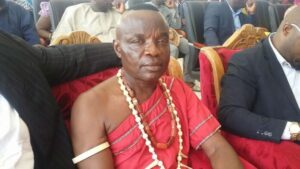
He further clarified that the consent judgment stipulates that the institution would be paying an honorarium sum of N10 million to Chief Ezeonwuka annually, for a period of 25 years, beginning from October 2010; and which would expire in 2035, after which the University would vacate his property at Oba and relocate to their permanent site at Umunya in Oyi Local Government Area of the state. He said it was also agreed that the honorarium could be upwardly reviewed every 5 years.
He further emphasized that both parties accepted this agreement that they reached by themselves and even also agreed within themselves that they would be charging N5000 sports development levy annually from the 3000 students the University had as its estimated population then, which would be amounting to N150 million annually. This, they also agreed that they would be sharing equal among themselves (which entitles each of them N75 million from the proceeds of the sports development levy annually). When this is added to the N10 million honorarium Ezeonwuka would be receiving every year, it means that he is entitled to receive a total of N85 million from the University every year.
According to Barr. Nwankwo, the parties signed this agreement which was prepared by their SAN lawyers, after which they unanimously took the agreement to the court and got it stamped as a consent judgement on the case, as was then stamped by the now-Chief Judge of Anambra State, His Lordship Hon. Justice Onochie M. Anyachebelu, in the year 2010. And both parties went home fulfilled that they have finally come to a truce.
This consent judgment, which expectedly marked a pivotal, calm and peaceful period in the legal wrangle between the parties, initially and momentarily appeared to have settled and ended the matter; but, however, surprisingly later became a catalyst for subsequent legal clashes that have now lasted for more years.
How did that happen?
It was gathered that barely five years after signing and obeying the consent judgment, in 2015, the University Management stopped paying Ezeonwuka his honorarium and his own share of the sports development levy as agreed in the consent judgment, with hundreds of millions of naira as accumulated debt owed him by the University.
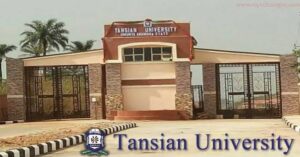
This indebtedness continued and accumulated further, even after Chief Ezeonwuka benevolently and graciously gave the school opportunity to pay the money by installment, which they also failed to do.
According to Barr. Nwankwo, it was then a shock when it was later learnt that the University lawyer advised the school Management that they could void and reverse that consent judgment for and based on certain reasons he gave them; and as a result of that advice, they refused to continue paying Chief Ezeonwuka his honorarium.
This, he said, made Chief Ezeonwuka approach the court again in 2018 to compel the school to pay, adding that he also filed a motion seeking the leave of court to levy execution on that consent judgment to confiscate all movable and immovable assets of the school, to enable him recover his property before the debt would go on to accumulate further, as he had already exercised enough patience for the University, which they took for granted.
According to him, during this time, the University also filed a counter motion contending that the earlier suit No. HID/89/2008 (filed in 2008 by Ezeonwuka) which culminated in the consent judgment in 2010 was incompetent, and that the leave of court to levy execution (which Ezeonwuka started seeking in the motion he filed in 2018) was also incompetent, hence praying the court to dismiss the two.
He explained that, because that 2018 motion filed by the University was an application seeking the dismissal of both Ezeonwuka's 2008 suit (that culminated in the 2010 consent judgment) and his 2018 motion, the Court entertained the University's motion first.
He, however, said, the court, after hearing the University's motion on November 22, 2018 at an Ogidi High Court 3, presided over by Justice Arinze Akabue, outrightly dismissed it, and adjourned the hearing of Ezeonwuka's own application to February 2019, which before it reached, Fr. Akam and the University had already rushed to the Appeal Court and filed an appeal against the November 2018 judgment of the High Court that dismissed their motion.

This, they reportedly did, to quickly move the case over to the Appeal Court so as to prevent the High Court from entertaining that motion filed by Chief Ezeonwuka in which he is seeking the leave of court to levy execution on that consent judgment to confiscate and sell all movable and immovable assets of the University to recover his money and property before the debt would go on to accumulate further, and which the court had adjourned to hear in February 2019.
Barr. Nwankwo said, although the University got an appeal number when they rushed to the Appeal court, but, surprisingly, when the date arrived, it was discovered that no counter affidavit was filed by them in the appeal, which made the High Court to entertain the motion earlier filed by Ezeonwuka. And the Court, in its ruling in that February 2029, granted Ezeonwuka's prayers and ruled that he should confiscate and sell off the University to recover all the unpaid honorarium accruable to him as contained in the 2010 consent judgment, since the university has violated the orders of the court by reneging on the payment of the agreed honorarium. And this became another brand new circle of victory for Chief Ezeonwuka.
This reporter, Izunna Okafor, however, gathered that, although Chief Ezeonwuka got this third round of victory against the University, he didn't immediately rush to levy its execution (i.e. to implement it), because of his empathy and sympathy, as he was being sympathetic and considerate of what would be the fate of the students schooling in the university if he sells off the university’s movable and immovable properties as authorized and directed by the Court, which unarguably would lead to automatic closure of the university and consequent shattering of the dreams and academic journeys of the students.
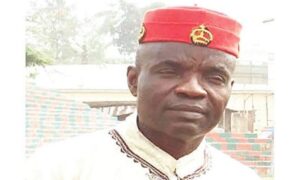
While Chief Ezeonwuka was still being sympathetic and considerate, Fr. Johnbosco Akam, also dissatisfied with this latest ruling of the High Court again, further dragged him (Chief Ezeonwuka) and his company, the Ranent Industries Company Ltd. to the Appeal Court via an appeal with the appeal number: CA/AW/67/2019, where he (Ezeonwuka) has just recently floored them (the University) again on May 14, 2024, in the presence of three Appeal Court Justices, in the latest judgment, delivered by Justice Asma'u Musa Mainoma.
Although Fr. Johnbosco Akam died earlier in 2021 (two years after the appeal commenced), he was replaced by Rev. Fr. Barr. Edwin Obiorah who sustained the contention, having been part of the protracted legal wrangle for years and reportedly the person who (in 2015) advised the school Management to stop paying Chief Ezeonwuka his honorarium, and which marked the period when the second phase of the contention began, which has now lasted till this latest Appeal Court judgment on the matter just some weeks ago.
According to a copy of the latest judgment obtained by this reporter, Izunna Okafor; it was observed that, throughout the latest legal proceedings, the University's legal team (the appellant's counsel) was contesting the jurisdictional basis and procedural fairness surrounding the 2010 consent judgment and other subsequent rulings that followed it on the matter. They vehemently argued against what they perceived as judicial overreach and procedural deficiencies, while also expressing concerns over the financial implications of the consent judgment on the institution, hence advocating for a reconsideration of the terms.
Summarily, they contended that the consent judgment's terms were onerous and questioned the High Court's jurisdiction to enforce such terms retroactively.
Conversely, Chief Ezeonwuka's legal team (the respondents' counsel) consistently argued for the enforcement of his co-ownership rights under the original consent judgment, dwelling their argument on the need to respect the sanctity of contractual agreements and court rulings, as well as the imperative of judicial oversight in resolving property disputes.
Be it as it may, the Court of Appeal, comprising Justices Obietonbara O. Daniel-Kalio, Isa Bature Gafai, and Asma'u Musa Mainoma, meticulously reviewed the arguments presented by both parties.

The appellate judges, however, thereafter, harped on the binding nature of consent judgments under Nigerian law and the importance of upholding contractual obligations between parties. They noted that the cessation of payments to Chief Ezeonwuka by the Tansian University constituted a breach of the consent judgment, justifying the previous rulings by the High Courts.
Delivering the court's verdict on the matter, Justice Asma'u Musa Mainoma, who articulated that the consent judgment was a legally binding agreement voluntarily entered into by both parties, ruled that Tansian University's appeal failed and is hereby dismissed.
“The effect of all the resolutions above is that this appeal fails and same is hereby dismissed,” Justice Mainoma said.
Justice Daniel-Kalio and Justice Gafai who described the University's appeal as incurably incompetent, also concurred with Justice Mainoma's judgment, emphasizing the need for the institutions to honor their contractual obligations to maintain public trust and uphold the rule of law.
“I have read the judgment of my lord Asma'u Musa Mainoma, JCA and I agree with my lord's reasons for upholding the preliminary objection of the Respondent and dismissing the appeal,” Justice Daniel-Kalio stated.
Contributing, Justice Gafai said: “I am in full agreement with the reasoning expressed in the lead Judgment by my learned brother Asma'u M. Mainoma, JCA that the Appellant's Notice of Appeal is patently and incurably incompetent.
“The Appellant's arguments to the contrary in a bid to save the Notice of Appeal from its glaring incompetence are impotent and therefore unhelpful to the Appeal.”
The appellant judge also recommended that be outrightly “struck out without more because, as it stands at that point, there is nothing thence to enquire into.”
This dismissal of Tansian University's appeal by the Court of Appeal and another victory of Chief Ezeonwuka marks another pivotal moment for Ogilisi Igbo in this protracted legal battle, reinforcing his earlier victories and legal standing in the age-old dispute, including the ruling of the High Court that gave him the authorization to confiscate and sell the University and recover his money.
Reports have it that Ezeonwuka, as at the last time the university equity was calibrated, he owns 81% equity shares of the university because of his landed property worth over N2 Billion; while only 13% belongs to Fr. Johnbosco Akam; while other people own the remaining shares.
Reacting further in this latest eminent victory, Chief Ezeonwuka, speaking through his legal counsel, Barr. Nwankwo, a legal luminary with over 34 years experience in the legal profession, maintained that all victories belong to God who is always just and upholds justice. He also stressed that a glaring truth would always remain a glaring truth, irrespective of how long one may try to challenge, contravene, or contradict it.
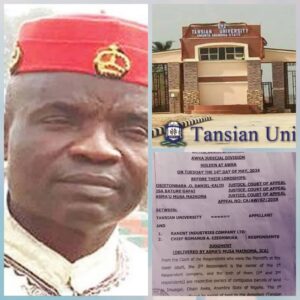
What's Your Reaction?






























































































